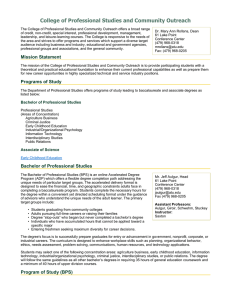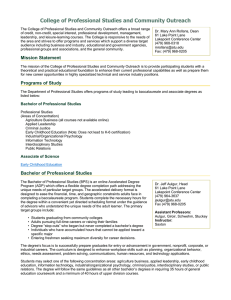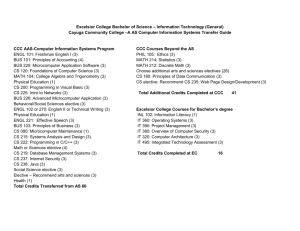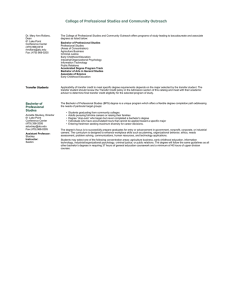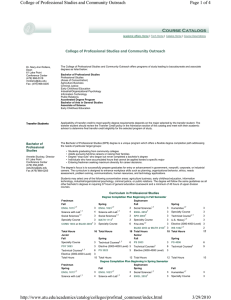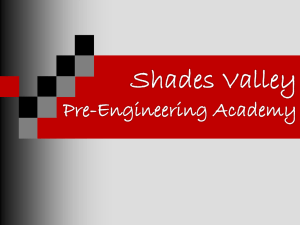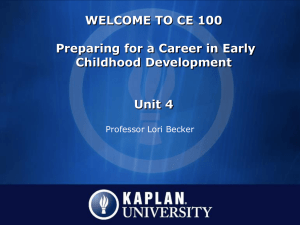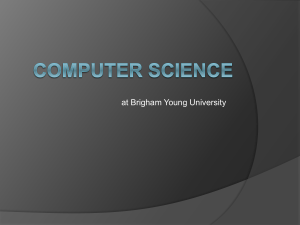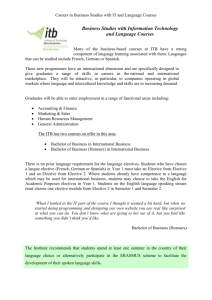College of Professional Studies and Community Outreach
advertisement
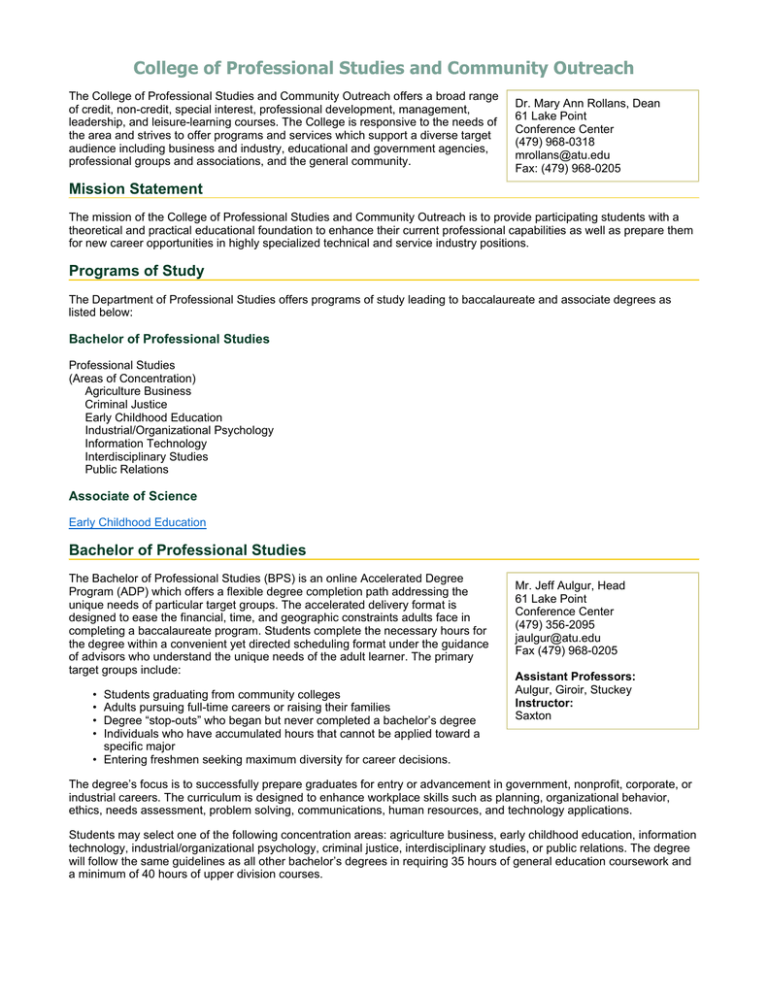
College of Professional Studies and Community Outreach The College of Professional Studies and Community Outreach offers a broad range of credit, non-credit, special interest, professional development, management, leadership, and leisure-learning courses. The College is responsive to the needs of the area and strives to offer programs and services which support a diverse target audience including business and industry, educational and government agencies, professional groups and associations, and the general community. Dr. Mary Ann Rollans, Dean 61 Lake Point Conference Center (479) 968-0318 mrollans@atu.edu Fax: (479) 968-0205 Mission Statement The mission of the College of Professional Studies and Community Outreach is to provide participating students with a theoretical and practical educational foundation to enhance their current professional capabilities as well as prepare them for new career opportunities in highly specialized technical and service industry positions. Programs of Study The Department of Professional Studies offers programs of study leading to baccalaureate and associate degrees as listed below: Bachelor of Professional Studies Professional Studies (Areas of Concentration) Agriculture Business Criminal Justice Early Childhood Education Industrial/Organizational Psychology Information Technology Interdisciplinary Studies Public Relations Associate of Science Early Childhood Education Bachelor of Professional Studies The Bachelor of Professional Studies (BPS) is an online Accelerated Degree Program (ADP) which offers a flexible degree completion path addressing the unique needs of particular target groups. The accelerated delivery format is designed to ease the financial, time, and geographic constraints adults face in completing a baccalaureate program. Students complete the necessary hours for the degree within a convenient yet directed scheduling format under the guidance of advisors who understand the unique needs of the adult learner. The primary target groups include: • • • • Students graduating from community colleges Adults pursuing full-time careers or raising their families Degree “stop-outs” who began but never completed a bachelor’s degree Individuals who have accumulated hours that cannot be applied toward a specific major • Entering freshmen seeking maximum diversity for career decisions. Mr. Jeff Aulgur, Head 61 Lake Point Conference Center (479) 356-2095 jaulgur@atu.edu Fax (479) 968-0205 Assistant Professors: Aulgur, Giroir, Stuckey Instructor: Saxton The degree’s focus is to successfully prepare graduates for entry or advancement in government, nonprofit, corporate, or industrial careers. The curriculum is designed to enhance workplace skills such as planning, organizational behavior, ethics, needs assessment, problem solving, communications, human resources, and technology applications. Students may select one of the following concentration areas: agriculture business, early childhood education, information technology, industrial/organizational psychology, criminal justice, interdisciplinary studies, or public relations. The degree will follow the same guidelines as all other bachelor’s degrees in requiring 35 hours of general education coursework and a minimum of 40 hours of upper division courses. Prior Learning Assessment (PLA) A Prior Learning Assessment (PLA) process is available which will award up to 12 hours of upper-division credit for relevant work experience, professional development, or military training through a portfolio course which provides the required documentation for determining the number of hours of credit which can be awarded. Learning Objectives for Professional Studies Degree • Communication: Student will demonstrate competency in public presentation and written communication skills. • Research: Student will apply empirical research to recommend relevant strategies for solving problems. • Leadership/Critical Thinking: Student will assume a leadership role in identifying and addressing issues in a realworld environment. • Project Management: Student will create, plan, and implement relevant strategies needed to develop a business proposal. Curriculum in Professional Studies Freshman Fall ENGL 10131,T Science with Lab 3 1,T 1,T 4 Social Sciences 3 Specialty Course 3 3 COMS 1003 or BUAD 2003T Total Hours Junior Fall Degree Completion Plan Beginning in Fall Semester Sophomore Spring Fall Spring 1,T 3 Elective 3 ENGL 1023 Fine Arts & Humanities1,T Science with Lab 1,T 1,T 4 T ENGL 2053 1,T 3 Specialty Course 3 3 2, T 3 Speech 3 Mathematics 3 Specialty Course 3 U.S. History/Government 3 Specialty Course 3 3 Elective (3000-4000 Level) 3 Social Sciences 1,T 16 Total Hours 16 Spring Technical Courses Technical Course 3 1,T Fine Arts & Humanities1,T Total Hours Senior Fall 15 Total Hours PS 3003 3 PS 4003 3 15 Spring 2, Specialty Course 3 PS 3133 3 Elective (3000-4000 3 Level) Technical Courses2 6 Technical Courses2 9 6 PS 3023 Elective (3000-4000 Level) 3 Elective (3000-4000 Level) 1 Technical Courses2, T 6 T 3 Elective (3000-4000 3 PS 3143 3 Specialty Course 3 Level) Total Hours 15 Total Hours 15 Total Hours 15 Total Hours Degree Completion Plan Beginning in Spring Semester Freshman Sophomore Spring Fall Spring Fall ENGL 10131,T 3 1,T Social Sciences1,T Specialty Course Science with Lab COMS 1003 or BUAD 2003T Total Hours Junior Spring ENGL 10231,T 3 4 Science with Lab 1,T 4 3 Social Sciences1,T 3 3 3 1,T 3 Mathematics Specialty Courses2 16 Total Hours 3 16 Fall Specialty Course 3 PS 3023 3 Technical Courses T 13 3 Fine Arts & Humanities1,T 3 ENGL 2053 3 Specialty Course 3 SpeechT Specialty Course 3 Technical Courses2, T Elective T 3 1,T 3 U.S. History/Government 3 3 Elective (3000-4000 Level) 3 Fine Arts & Humanities1,T Total Hours Senior Spring 15 Total Hours PS 3003 3 PS 4003 3 Technical Courses2 6 Technical Courses2 9 15 Fall 2, 6 Elective (3000-4000 6 Level) Technical Courses2, T 6 PS 3143 3 PS 3133 Total Hours 3 15 Total Hours 15 Elective (3000-4000 Level) 3 Specialty Course Total Hours 3 15 Total Hours Elective (3000-4000 Level) 1 13 1 See appropriate alternatives or substitutions in "General Education Requirements". Technical courses taken as part of an associate degree or from a community college may be transferred into the BPS degree. 3 At least 40 of the total hours required for graduation must be 3000-4000 level courses: no more than 30 hours of electives towards the degree may be taken from the College of Business. T Designates a block of courses that would provide for a seamless transfer into this program if equivalent courses are taken at another college or university. 2 Specialty/Concentration Areas: Early Childhood Education: 18 hours Take: ECED 2001 and ECED 2002 (concurrent enrollment); ECED 3023 and ECED 3033 (concurrent enrollment); EDMD 3013, MATH 2033, and BIOL 3213. Industrial/Organizational Psychology: 19 hours Take: PSY 2003, PSY 2053, PSY 2074 and 9 hours from the following: PSY 2023, PSY 3093, PSY 4033, PSY 4043, PSY 4234. Public Relations: 18 hours Take: COMS 2003, SPH 3033, SPH 4153, JOUR 3173, JOUR 3273, and JOUR 4173. Information Technology: 19 hours Take: COMS 1333, COMS 1403, COMS 1411, COMS 2003, COMS 2233, COMS 2700, COMS 2703, and 3 hours COMS elective credit. Criminal Justice: 18 hours Take: CJ 2003, CJ 2043, CJ 3023, CJ 3103, CJ 3153 and 3 hours of CJ elective. Agriculture Business: 18 hours Take: AGBU 2063, AGBU 2073, AGBU 3133, AGBU 4003,AGBU 4013, and AGBU 4023. Interdisciplinary Studies: 18 hours (Courses selected with advisor approval) Early Childhood Education Associate of Science The Associate of Science in Early Childhood Education is an online degree Assistant Professors: structured to provide a seamless acquisition of academic requirements for various Aulgur, Giroir career levels in occupations related to child care and early childhood education in the public and private sectors. The early childhood education courses provide the academic requirements for meeting assessment guidelines for the Child Development Associate (CDA) credential. The general education courses can be applied toward the Bachelor of Professional Studies degree in Early Childhood Education. Learning Objectives for Early Childhood Education Degree • Demonstrate knowledge and understanding of child development and learning • Know about, understand, and value the role of a child's family, culture, and community in children's lives • Work cooperatively with parents, using an understanding of the family as a context for young children's development • Demonstrate knowledge, skills, and dispositions of a reflective early childhood practitioner • Demonstrate knowledge of health, safety, nutrition, and administrative guidelines • Develop a thorough understanding of child development and the value of play in children's learning • Design developmentally-appropriate curriculum and classroom practices • Adhere to ethical practices in the field of early childhood education Curriculum in Early Childhood Education Freshman Fall Suggested Sequence of Courses Sophomore Fall Spring 3 ENGL 1013 1,T 3 Mathematics Science with Lab 1,T 4 ENGL 1023 Science with Lab 1,T Speech 3 1,T 4 3 Spring Fine Arts & Humanities1,T 6 ECE 2513 ECE 2613 3 3 U.S. History/Government1,T 2 ECE 2991-9 NUR 2303 1 3 9 3 Social Sciences1,T ECE 2113 TECH 1001 Total Hours 1 3 Social Sciences1,T 3 ECE 2313 3 3 1 17 Total Hours 16 Total Hours 12 Total Hours See appropriate alternatives or substitutions in "General Education Requirements". Enrollment must be approved by advisor. T Designates a block of courses that would provide for a seamless transfer into this program if equivalent courses are taken at another college or university. 2 15
